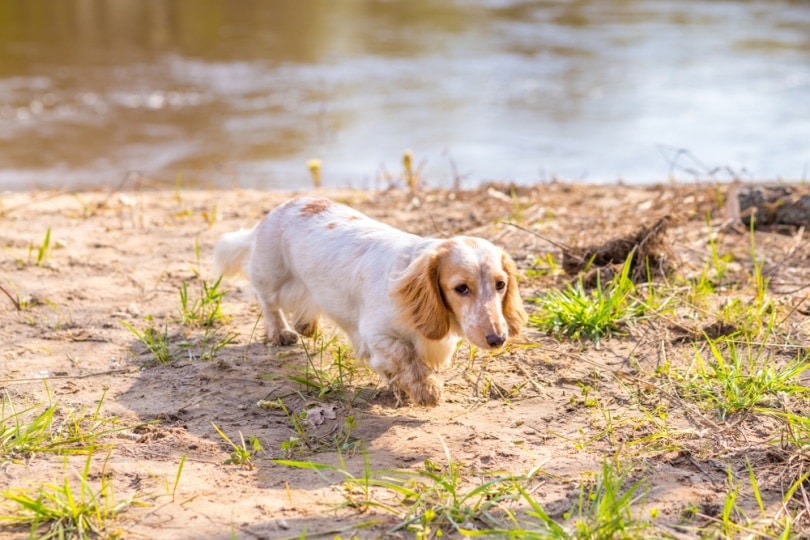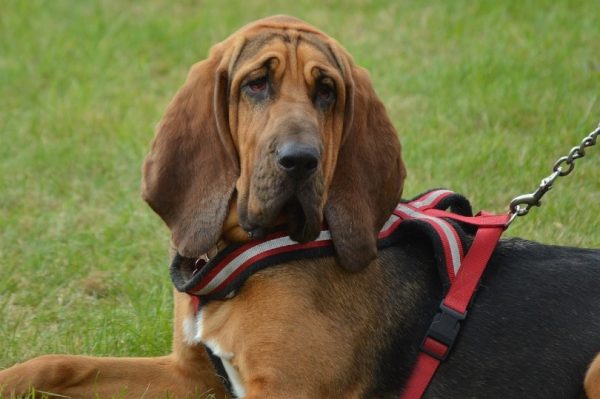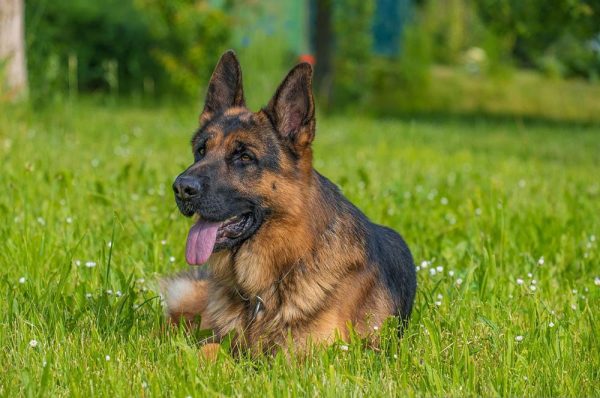You are probably all too familiar with the adorable Dachshund, one of the most popular breeds on the AKC popularity list.1 This spunky, adventurous little dog has an award-winning personality and an incredibly unique appearance.
Breed Overview
Height:
14–19 inches (Standard); 12–15 inches (Miniature)
Weight:
16–32 pounds (Standard); under 11 pounds (Miniature)
Lifespan:
12–16 years
Colors:
White
Suitable for:
Families with older children
Temperament:
Devoted, playful, curious
So, is a white Dachshund a thing? The answer is absolutely! White is a color that can be in the Dachshund gene pool, but it’s not officially recognized. Let’s delve deeply into this topic.
Dachshund Characteristics

The Earliest Records of White Dachshunds in History
It is tough to know specifically when the white Dachshund showed up. The AKC does not recognize white as a primary or formal color for Dachshunds.
But white has been genetically possible for almost as long as the breed has been around. All it takes is just the right genetic combination to make a white Dachshund puppy.
How White Dachshunds Gained Popularity
Since white is a severely scarce coat color for Dachshunds, it makes them even more special. Many people enjoy what is different, and seeking a coat color that isn’t often seen is a big attraction.
Formal Recognition of the White Dachshund
Despite white being genetically possible in the Dachshund breed, it is not a common occurrence. Therefore, you can expect prices to be higher with these particular dogs.
Also, white is not a color that the AKC recognizes, so you cannot have a registered white Dachshund. However, there is a cream variation that is approved. This color is close to white, with a soft, beautiful, creamy hue. This color of Dachshund is available in both Standard and Miniature, as well as long, short, or wire haired.

Top 5 Unique Facts About Dachshunds
Dachshunds have not maintained their popularity all these years for nothing. These incredible little dogs are adventurous, enthusiastic, and so much fun to have in the home. In addition to their fun, elongated appearance, they have a brave personality that is alluring to potential owners.
So, whether you’re looking for a white Dachshund or any other color, here are astonishing facts about the breed.
1. White Dachshunds are not always albino
White Dachshunds can be that color on their own accord. It takes two parents with the right genetics to create that coat, though.
Albino outcomes are genetic mutations found in the system. Most albino Dachshunds are completely pale from head to toe, including their skin. White Dachshunds can have a bit of color variation on the skin and nose.
Just because the AKC doesn’t recognize this color of Dachshund does not mean that they do not exist currently. In fact, due to their rarity, some of them can cost even more than their AKC-recognized pals.
2. The Dachshund inspired the hotdog
You might look at a hot dog and automatically associate it with this breed, and you would be right! However, even though the Dachshund so resembles a hot dog that we make funny puns about it, they were actually the innovator of this food style.
So, even though the chicken or the egg debate is still going on, the Dachshund versus hot dog debate is not—mystery solved!
3. The Dachshund is a German breed
The Dachshund is a German breed. They were almost completely wiped out during World War II, but these dogs are resilient and have flourished ever since.
4. The Dachshund was the first Olympic mascot
In the 1972 Munich Olympic Games, a colorful Dachshund named Waldi was the very first mascot.
5. Britain cloned a Dachshund first
Cloning is quite a controversial topic these days. Companies in the United States, the United Kingdom, and worldwide will clone existing pets. All you need is a DNA sample.
The very first cloned dog in Great Britain was a Dachshund! This successful clone was named Winnie; the new mini Winnie might have looked exactly like her old self, but she had a brand-new personality.
Essentially, you’re paying scientists roughly $60,000 to recreate the exact genetic makeup of your dog, but not the same personality. So, only you can decide if that would be worth it for you.

White vs. Albino Dachshunds: How to Tell the Difference
There can be both white and albino Dachshunds. The albino mutation is a genetic mutation in the womb that causes the particular dog to have a lack of pigment. The key difference between a white Dachshund and an albino Dachshund is that white Dachshunds tend to have color in their nose and eyes.
Does a White Dachshund Make a Good Pet?
The white Dachshund can make an incredible addition to any family. They have a wonderful personality, are eager to please, and are always down for an adventure.
Dachshunds work quite well in a variety of situations, so you can be certain they would be outstanding for a senior owner or a huge family with multiple kids. They tend to get along well with other dogs and cats alike. However, since they are quite spunky, brave, and energetic, they can challenge authority sometimes.
Even though most people will do fine with the breed as their first introduction to the canine world, this dog might do better with an advanced owner. Regardless, this breed can make an amazing addition to your home with proper discipline and direction. Along with their unique color, white Dachsunds are sure to turn heads and get lots of “oohs” and “ahhs” from your neighbors, family members, and friends.
However, don’t go into the process demanding a white Dachshund. First, they’re rare. Second, there are so many different coat types for this breed. Don’t be afraid to explore the variations!

Conclusion
The white Dachshund has a rare but beautiful coat variation. Even though the AKC does not recognize it, you can still have luck finding a white Dachshund, possibly close to you!
Even if you can obtain a white Dachshund in your lifetime, whether through happenstance, travel, or luck, know that there are many other different coat types and colors. Don’t be afraid to explore the breed’s vastness to pick the particular Dachshund that you want to call your own.
See also:
- What It Means When Your Dog Walks Around Holding a Toy
- How to Keep Your Dog Calm During Home Renovations
Featured Image: Ekaterina Kuchina, Shutterstock


















